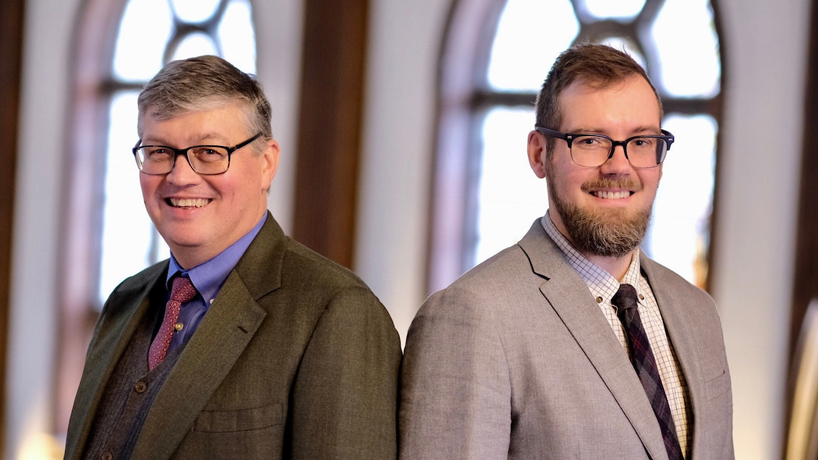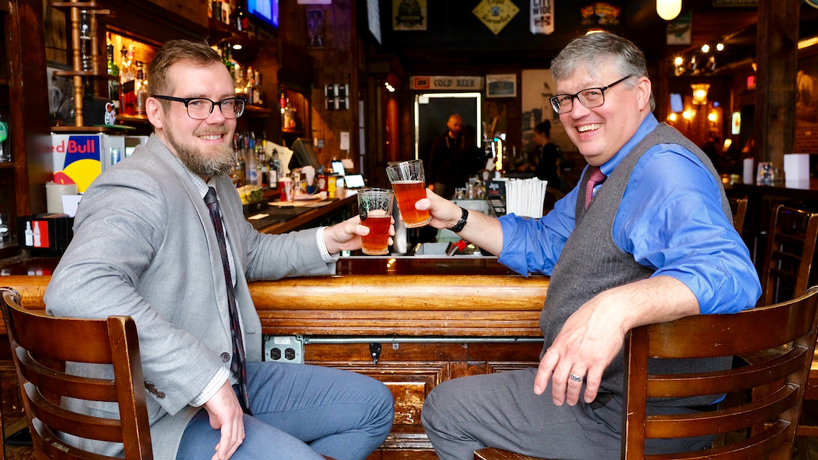
Philosophy Professors Jon McGinnis and Billy Dunaway won a nearly $1 million grant from the John Templeton Foundation to examine the writings of medieval Islamic thinkers for answers to questions of contemporary philosophy of religion. (Photos by August Jennewein)
What started as a conversation over beers at a local tavern has led, more than a year later, to $1.1 million in research funding for two members of the Department of Philosophy at the University of Missouri–St. Louis.
Professor Jon McGinnis and Assistant Professor Billy Dunaway concocted their idea to bring together medieval Islamic philosophy and apply it to contemporary questions about the epistemology of religion, and they secured a grant of $933,000 from the John Templeton Foundation plus additional funding from UMSL to support the project, entitled “The Christian West and Islamic East: Theology, Science, and Knowledge.”
“We’re going to start looking at figures who never were translated or even known in the Latin tradition, and yet who are still dealing with the same sorts of problems and questions,” McGinnis said. “What can we know? What is the relationship between science and the claims of religion? If there is a God, what is God’s relation to creation?”
These are questions that contemporary philosophers of religion continue to explore, but existing discussions don’t draw on the writings of medieval Islamic thinkers.
“Their answers to those questions haven’t been explored,” McGinnis said. “They’re the ones that Templeton is interested in. The Arabs were interested in them, and their arguments are highly sophisticated and really good.”
McGinnis and Dunaway hope the grant will help them bring more attention to this area of study and help inspire more study from younger scholars in the early stages of their careers.
“We want to involve older scholars, but a lot of times older scholars have their research program set and that’s what they do,” Dunaway said. “The whole point of this is it’s something slightly different than what’s being done already.”

Billy Dunaway and Jon McGinnis had the idea to marry their two areas of study while discussing one of Dunaway’s papers over beers at Three Kings Public House in the Delmar Loop.
They plan to invite academics from different regions of the world, including the Middle East, to conferences or workshops each of the next three summers. They will be opportunities for individuals to present their work but also to become more familiar with texts to which they otherwise might never be exposed.
The plan is to hold the first two workshops at UMSL, but the 2021 event will take place at the University of Oxford in England.
“Given the current political climate, bringing folks from the Middle East over here may be more difficult,” McGinnis said. “It’s just a fact. So Templeton said, ‘We’ve got these contacts in Oxford …’ And we’re like, ‘Oxford? We’d love to be in Oxford.’”
With the grant, McGinnis and Dunaway also plan to award research stipends to promising young scholars. They hope to fund at least one master’s student in the Department of Philosophy to serve as a research assistant.
They also plan to bring a visiting scholar in Islamic philosophy to the UMSL campus in 2020. They hope that individual will deliver a public lecture, just one of the events they intend to hold to involve the public.
McGinnis and Dunaway want the project to help generate scholarly articles, presentations, an edited volume and a special journal issue that examines the contributions the Islamic tradition can make to contemporary debates.
McGinnis, who chairs the Department of Philosophy, has spent much of his career researching medieval Islamic thinkers, an area of study that also includes some Christian and Jewish philosophers writing at the time in Arabic.
His interest developed during his time studying classical philosophy as a doctoral student at the University of Pennsylvania. He noticed much work being done on the writings of Greek and Latin philosophers. But a gap existed in between them.
“What was happening is as classicists were working, they were coming up against this wall that was the Arabic language,” McGinnis said.
He received a fellowship to learn Arabic and spent time studying in Egypt.
It has paid dividends throughout his career since, helping him gain access to ideas from prominent thinkers such as Avicenna, Averroes and Moses Maimonides, who remain largely overlooked in the English-speaking world.
Dunaway’s work has been centered more on ethics, metaphysics, epistemology and the philosophy of language. He received his PhD from the University of Michigan and went on to work as a postdoctoral fellow at Oxford under John Hawthorne, a noted epistemologist who also works in the philosophy of religion.
McGinnis has served as one of Dunaway’s mentors since Dunaway came to UMSL four years ago, and they meet regularly – occasionally off campus at Three Kings Public House in the Delmar Loop.
“In good philosophical fashion, we were sitting over a beer discussing his paper, which was drawing on the Medieval Latin philosopher Duns Scotus,” McGinnis said. “I said, ‘Oh, these Muslim guys I read are kind of interested in a similar problem and have similar but slightly different answers.’”
The more they talked, they realized the potential of bringing these two disciplines together, and Dunaway knew from his time with Hawthorne that there was a chance the Templeton Foundation might fund just such a project.
They’re both elated that instinct was correct, that their formal proposal was accepted and they’re beginning the work.
“It’s a lot of fostering more intellectual engagement by getting people with the different norms and expectations of different intellectual communities together,” Dunaway said. “The hope is that after the project is done people continue with the connections they’ve made and there’s more engagement and diversity in the intellectual environment.”
Media Coverage
St. Louis Business Journal














